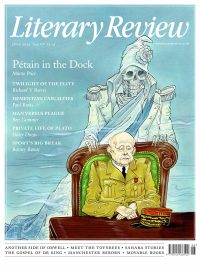Piers Brendon
Taipans, Pirates and Courtesans
Fortune’s Bazaar: The Making of Hong Kong
By Vaudine England
Corsair 368pp £25
Hong Kong was never a monolith, always a mosaic. This is the message of Fortune’s Bazaar, a scholarly history of what began as a den of opium smugglers in 1841 and became, during the century or so that the book covers, the last link in the chain of naval and commercial strongholds binding the British Empire together. Hong Kong was a ‘floating world’ of mixed and shifting identities. Its deep harbour and strategic location attracted traders, pirates, sailors, labourers, artisans, entrepreneurs, clerks, missionaries, prostitutes, gamblers, bankers, brokers, lawyers and others, who brought energy and enterprise from the ends of the earth. The port city contained a gallimaufry of different races, cultures, languages and religions. As the historian Ackbar Abbas has said, it was not so much a nation as ‘a hyphenation’.
To Victorian visitors, its cosmopolitan character was vividly apparent in the streets. These were thronged with ragged coolies carrying heavy loads on bamboo poles, Chinese shopkeepers dressed in brown cotton, Calcuttan importers in crimson turbans, Sikhs in Madras muslin, Malays in red sarongs, frock-coated Portuguese in sola topis, jewelled and chimney-hatted Parsees, skull-capped Jews, blue-clad Japanese courtesans in wooden shoes, Celestials in brocaded robes waving their fans and uniformed European soldiers seeking oriental curios. The bazaars overflowed into the thoroughfares and pedestrians encountered a scurrying medley of rickshaws, gigs, phaetons and sedan chairs. No city in the world, wrote an American traveller in 1866, could present a more diverse, fantastic and raucous scene. The air was resonant with the babble of many tongues, ‘the twang of the banjo, the song of the minstrel, the indescribable plaint and whoop of burden bearers, the cries of men hawking their wares, the din of countless rattle-boxes, and the rush of wheels – sounds mellifluous, discordant and ear-splitting’.
Vaudine England argues that Hong Kong owed its vitality to its variety. The different races mixed in the marketplace and the godown, and they also met in bed. The resulting caste of Eurasians included many ‘in-betweeners’, hybrid figures who transcended their origins. Protean and multilingual, they bridged cultural

Sign Up to our newsletter
Receive free articles, highlights from the archive, news, details of prizes, and much more.@Lit_Review
Follow Literary Review on Twitter
Twitter Feed
Under its longest-serving editor, Graydon Carter, Vanity Fair was that rare thing – a New York society magazine that published serious journalism.
@PeterPeteryork looks at what Carter got right.
Peter York - Deluxe Editions
Peter York: Deluxe Editions - When the Going Was Good: An Editor’s Adventures During the Last Golden Age of Magazines by Graydon Carter
literaryreview.co.uk
Henry James returned to America in 1904 with three objectives: to see his brother William, to deliver a series of lectures on Balzac, and to gather material for a pair of books about modern America.
Peter Rose follows James out west.
Peter Rose - The Restless Analyst
Peter Rose: The Restless Analyst - Henry James Comes Home: Rediscovering America in the Gilded Age by Peter Brooks...
literaryreview.co.uk
Vladimir Putin served his apprenticeship in the KGB toward the end of the Cold War, a period during which Western societies were infiltrated by so-called 'illegals'.
Piers Brendon examines how the culture of Soviet spycraft shaped his thinking.
Piers Brendon - Tinker, Tailor, Sleeper, Troll
Piers Brendon: Tinker, Tailor, Sleeper, Troll - The Illegals: Russia’s Most Audacious Spies and the Plot to Infiltrate the West by Shaun Walker
literaryreview.co.uk